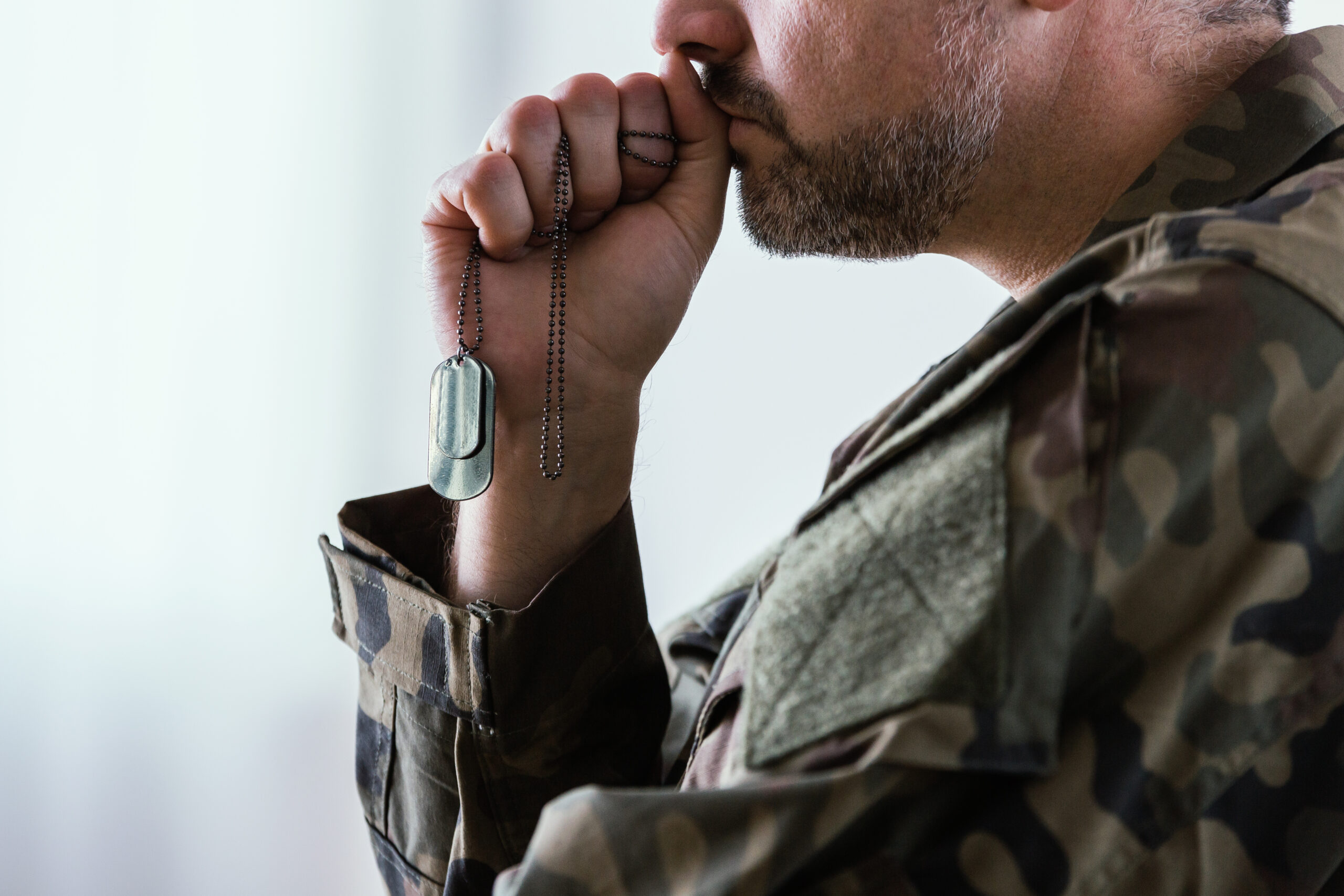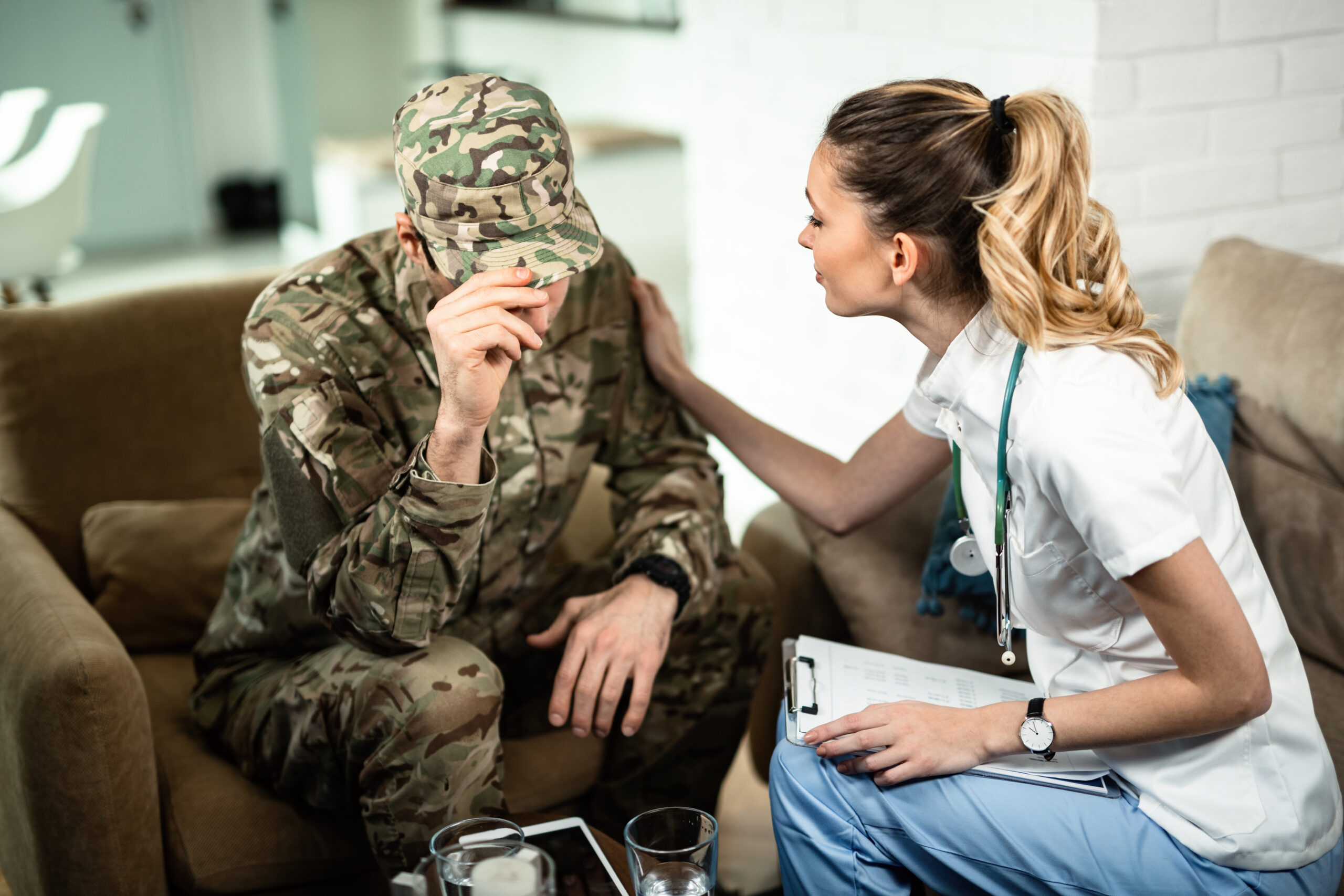Statistics around mental health for veterans shows that approximately one-fifth of Canadian veterans experience a diagnosed mental health disorder such as post-traumatic stress disorder (PTSD), anxiety, and depression at some point in their lives. In fact, several senior veterans find that they experience symptoms of PTSD, even after several years of their time spent in service. With several studies done, it is common for a veterans’ old mental wounds to resurface as they age, causing them to relive or remember certain memories and impairing their mental wellness.
Mental health issues among senior veterans often go unnoticed and undiagnosed due to the social stigma around the topic. Such stigma has led to reluctance in exploring veterans’ mental health services, and instead, bottle up their emotions in order to appear resilient. It then becomes extremely crucial for family members to pay special attention and go the extra mile to ensure that the senior veterans in their lives are not silently – and unknowingly – suffering from invisible wounds.
Types of Mental Health Concerns for Veterans
Much like civilians, veterans – including elderly ones – are at risk of experiencing mental health challenges such as feelings of anger, sadness, anxiety, low self-esteem, and frustration. They can also suffer from operational stress injury, commonly referred to as “OSI”, which is “any persistent psychological difficulty resulting from operational duties performed while serving in the Canadian Armed Forces or as a member of the Royal Canadian Mounted Police”. OSI includes a broad range of mental conditions including anxiety disorders, depression, PTSD, and other conditions that might not be as severe, but nevertheless prove to be an obstacle in daily functioning. In addition to this, mental health disorders could also lead to substance abuse and suicide. This makes it imperative to pay special attention to the elderly veterans in your life and promote mental health.
Promoting Positive Mental Health Activities
Through recommendations, strategies, and contributions from loved ones, elderly veterans suffering from mental illness can become more resilient. Family, friends and caregivers can leverage these few simple tips to promote mental health in aging veterans.
Spend time with them and create a safe space to chat
Support and understanding from family and friends can go a long way in the mental healing process of older veterans. It is common for senior veterans to feel lonely, and so, it is crucial to let the veteran in your life know that you’re open to hearing about how they’re feeling, whether good, bad or even irrational. What’s more, it is also likely that the senior veteran may not be aware that they’re suffering from any mental health issues – allowing them to talk through how they’re feeling can help them understand what they’re going through. So, try having a conversation with the elderly vet in your life while participating in an activity with them (like going for a walk, playing board games, or even over a cup of coffee). This might allow them to get comfortable and let the conversation take place more organically.
Through this kind of social support and interaction, not only will you become aware of any mental health issues the senior vet in your life might be facing, but also help distract them from uncomfortable wartime memories. This, in turn, could potentially reduce the risk of diseases such as depression, anxiety, and PTSD. However, remember not to badger them into sharing how they’re feeling. While your intentions may be good here, this could make them feel stressed, and instead, worsen their anxiety or any other mental disorder they might be suffering from.
Introduce them to support groups
It is common for veterans of all ages to be hesitant about talking to their loved ones regarding their time in the military, as they believe civilians may not fully understand their experience. In such cases, family members could offer to introduce the senior veterans in their life to support groups. In fact, peer support networks are one of the best free mental health services available. Here, elderly vets may find comfort in chatting with fellow soldiers who have shared their wartime experiences. They could also find additional support from others in the form of resources and advice that encourage mental well-being. Moreover, by interacting with others regularly, older vets may also be able to shake feelings of loneliness and isolation that could otherwise trigger mental health problems.
Educate them about veterans’ mental health services
There exists a misconception about a lack of mental health services for veterans. In actuality, there are several resources available to promote veterans’ mental health in Canada. This includes free mental health services for veterans such as 24/7 helplines and online chatting tools where professionals help those in need with a variety of issues.
Acquainting the senior vets with such services will encourage them to discuss their problems while concealing their identity, in case they are uncomfortable talking to somebody face-to-face due to the social stigma around mental health. Additionally, services such as these allow these conversations to take place at any time of the day, thereby letting older vets share their thoughts and emotions whenever they most feel like it. After all, a family member or friend may not always be around in the middle of the night to help ease the veteran’s mind.
Familiarize them with coping strategies
It is common for negative feelings and memories of wartime experiences to sneak up on senior veterans with little to no warning. It is also highly likely that these feelings could occur when they are alone, with no family around to help them cope. In times like these, it is important that aging vets are equipped with the right self-help mechanisms to deal with the situation. Thus, identifying such strategies and educating older vets about them must be a priority.
A couple of coping strategies that could be adopted include breathing exercises, becoming familiarized with mental well-being apps, and engaging in distracting activities – basically, anything that could help shun negative thoughts or emotions! However, it is vital to identify a coping mechanism that works for the veteran. Remember, there is no one-size-fits-all strategy here, and it may take some time, observation, and research to truly understand what makes the senior vet in your life feel better.
 Spotting the Signs
Spotting the Signs
In addition to promoting mental health among senior veterans, it is also important for loved ones and caregivers to recognize the symptoms of underlying mental health issues, and what triggers them. It is important for family members to observe the older vets in their life and watch out for what triggers them. This makes timely intervention much easier and helps prevents aging veterans from suffering from any mental discomfort. Let’s take a look at the symptoms of common mental health disorders senior veterans tend to suffer from.
Post-Traumatic Stress Disorder (PTSD)
Symptoms of Post Traumatic Stress Disorder often linked reliving the event – Elderly veterans might have traumatic nightmares or flashbacks of their time in service. Even certain situations, people, or objects may remind veterans of their time in the military, which could result in them having panic attacks caused by PTSD. Senior veterans with PTSD may also experience hyper arousal. This means that when they are stressed, their flight-or-flight response does not subside, causing them to feel nervous or jittery, be unable to sleep, or feel unsafe and become easily startled .
Anxiety and Depression
Two common signs of a digressing veteran are exhibiting symptoms of anxiety and/or depression. This includes experiencing nightmares, having excessive fears or even worrying about day-to-day decisions and activities. This can also contribute to a lack of interest in things they once enjoyed or lead to feelings of sadness for extended periods of time. Suicide and self-harm can be factors of both anxiety and depression and must be taken seriously. If you notice this type of behaviour or your loved one expresses this behaviour please find immediate help.
In result to these changes, your loved one may also experience inability to control impulsive decisions such as gambling, or excessive eating and drinking. They may also have a harder time making positive choices and may have an impairment on judgment or display erratic behaviour when they are upset or frustrated. Anxiety and depressive symptoms can also include an inability to concentrate on daily tasks or even have an altered memory.
There are many physical symptoms linked to anxiety such as an increase in heart rate or blood pressure. Your loved one may also experience a racing pulse, sweating, feelings of tension, uneasiness, tremors, twitching, and shortness of breath.
Substance Abuse Disorder
Substance abuse in veterans and seniors is more common than you may think and is often used as a distraction from other mental health complications like dealing with anxiety, depression and/or PTSD. Any over usage of legal or illegal substances could become very harmful to a persons mental and physical state.
Irritability, easily agitated or an increase in aggression are common signs of a persons experiencing substance abuse. Physical signs may include slurred speech, large dilated eyes, and/or a lack of body coordination.
Aging veterans have not only sacrificed a lot for their country but for their loved ones as well. This makes it extremely important to provide them with unconditional support and equip them with the necessary resources, advice, and strategies to ensure they are mentally sound and therefore, healthy. When it comes to mental health, senior veterans might not always ask for help. It is up to the family and friends to proactively reach out and monitor their mental health, just as they do when it comes to physical wellness.
 Neighbourhood Care is an authorized home care provider for Canadian Veterans
Neighbourhood Care is an authorized home care provider for Canadian Veterans
To learn more call: 905-330-1353 or Send Us A Message. Neighbourhood Care is registered with Veterans Affairs Canada (VAC) as an authorized provider of home care for Canadian Veterans under the Veterans Independence Program (VIP). The Veterans Independence Program provides limited financial assistance to eligible veterans to enable them to remain independent and self-sufficient in their own homes and communities for as long as possible and to provide care in an institution when such care is needed. Our home care team maintains a thorough and up-to-date understanding of the process and can answer any questions you may have. Visit VAC Website
